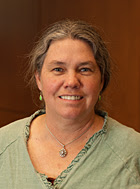The amplification of our lives by technology grants us a power over the natural world which we can no longer afford to use. In everything we do we must be mindful of the lives of others, cautions, constrained, meticulous. We may no longer live as if there were no tomorrow. –George Monbiot
 Hi, my name is Amy Brunvand and I’m running for Coordinator Elect of SustainRT.
Hi, my name is Amy Brunvand and I’m running for Coordinator Elect of SustainRT.
I’m an academic librarian at the University of Utah where I’m a government information specialist and the librarian liaison for programs in Environmental & Sustainability Studies and Environmental Humanities. Like Art Dog, I lead a secret double life — Librarian by day, writer (and sometimes tango dancer) by night.
How did you become interested in libraries and sustainability?
Back in 1992 I read Bill McKibben’s The Age of Missing Information and wrote a largely un-read op-ed for Colorado Libraries magazine about preserving hyper-local information in the interest of what, at the time, was not yet called sustainability. I was also inspired by Wendell Berry’s ideas about the importance of place and the do-it-yourself ethos of “Whole Earth Review” (before it became obsessed with computer technology). To me, the essential link between libraries and sustainability is community engagement, and I recently co-authored an article about using government information to inform sustainability. Since 2001 I have written a monthly environmental news column for Catalyst magazine. My goal is to connect the dots between local issues, public policy and citizen groups. Through this writing I realized that the library is an ideal place to nurture ecologically literate, engaged citizenship, so a few years ago I jumped at an opportunity to change my liaison work from math/computer science to environment/sustainability studies.
What motivated you to run for Coordinator Elect of SustainRT?
Frankly, alternatives to sustainability are pretty scary. I feel a sense of urgency about the state of the world and I’d like an excuse to spend more time working on sustainability issues. There is a lot of synergy between the Big Ideas of Sustainability and the Core Values of Librarianship, and we librarians are in a great position to facilitate the transition to more sustainable and resilient future. Opportunities to promote sustainability exist in all areas of librarianship, not just green buildings. For instance, I’ve noticed that articles about whether eBooks or print books are more sustainable nearly always point out that borrowing library books is the most sustainable choice. Richard Louv suggests that libraries could be “naturebraries” that serve as hubs of bioregional knowledge. Another crucial role for libraries is enabling patrons to make a difference since change usually comes from the grassroots up; as Wendell Berry says, “The “leaders” will have to be led.”
How do you see the role of SustainRT?
SustainRT is the Jiminy Cricket of ALA, a little voice that keeps insisting sustainability is important. We are off to a great start and I’d like to keep the energy high. I hope we will develop our sense of community, maybe working with the Outreach Chair to host an online reading group, or a question-of-the-month discussion. Besides webinars and conference programs, SustainRT should be an incubator for practical ideas.
Anything else you’d like to say?
Sustainability can be fun! Here’s an example of a student project I love: MovingU aims to reduce air pollution by encouraging alternative transportation choices. As part of the project students gathered personal stories about air quality (I’m flattered that they picked a story I wrote). The library helped with information, tech support, promotion and archiving but students are the ones driving this project.
REFERENCES
Amy Brunvand (1992) “Resource Sharing and the Importance of Place.” Colorado Libraries, 18 (2), pp. 22-24.
Amy Brunvand & Ambra Gagliardi(2015) “Sustainability, Relocalization, Citizen Activism and Government Information.” Dttp: Documents to the People, 43(2), pp..10-13.
Richard Louv (2008) Last child in the woods: Saving Our Children from Nature-Deficit Disorder.
George Monbiot (2014) Feral: Rewilding the Land, the Sea, and Human Life.
Bill McKibben (1992) The Age of Missing Information.